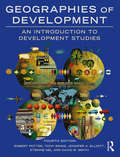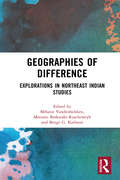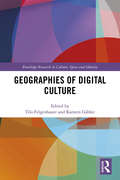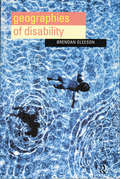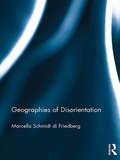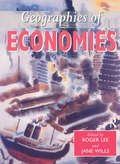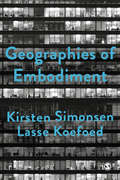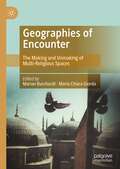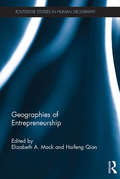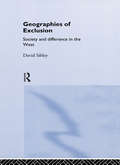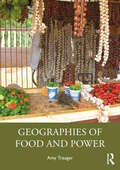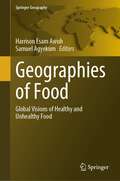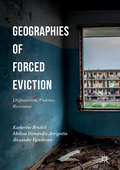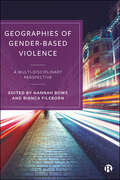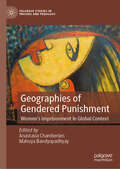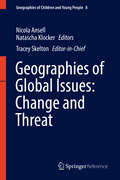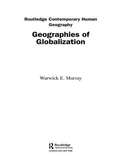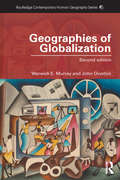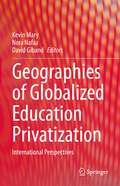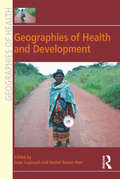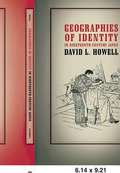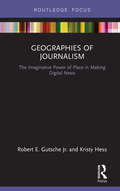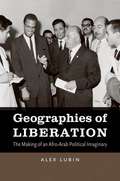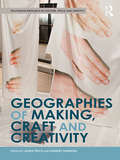- Table View
- List View
Geographies of Development: An Introduction to Development Studies
by Robert Potter Tony Binns David W. Smith Etienne Nel Jennifer A. ElliottNow in its fourth edition, Geographies of Development: An Introduction to Development Studies remains a core, balanced and comprehensive introductory textbook for students of Development Studies, Development Geography and related fields. This clear and concise text encourages critical engagement by integrating theory alongside practice and related key topics throughout. It demonstrates informatively that ideas concerning development have been many and varied and highly contested - varying from time to time and from place to place. <P><P> Clearly written and accessible for students, who have no prior knowledge of development, the book provides the basics in terms of a geographical approach to development what situation is, where, when and why. Over 200 maps, charts, tables, textboxes and pictures break up the text and offer alternative ways of showing the information. The text is further enhanced by a range of pedagogical features: chapter outlines, case studies, key thinkers, critical reflections, key points and summaries, discussion topics and further reading. <P><P> Geographies of Development continues to be an invaluable introductory text not only for geography students, but also anyone in area studies, international studies and development studies.
Geographies of Difference: Explorations in Northeast Indian Studies
by Mélanie Vandenhelsken Meenaxi Barkataki-Ruscheweyh Bengt G. KarlssonThis book rethinks Northeast India as a lived space, a centre of interconnections and unfolding histories, instead of an isolated periphery. Questioning dominant tropes and assumptions around the Northeast, it examines socio-political and historical processes, border issues, the role of the state, displacement and development, debates over natural resources, violence, notions of body and belonging, movements, tensions and relations, and strategies, struggles and narratives that frame discussions on the region. Drawing on current and emerging research in Northeast India studies, this work will be of great interest to scholars and researchers of politics, human geography, sociology and social anthropology, history, cultural studies, media studies and South Asian studies.
Geographies of Digital Culture (Routledge Research in Culture, Space and Identity)
by Tilo Felgenhauer Karsten Gäbler“Digital culture” reflects the ways in which the ubiquity and increasing use of digital devices and infrastructures is changing the arenas of human experience, creating new cultural realities. Whereas much of the existing literature on digital culture addresses the topic through a sociological, anthropological, or media theoretic lens, this book focuses on its geographic aspects. The first section, “infrastructures and networked practices” highlights the integration of digital technologies into everyday practices in very different historical and geographical contexts—ranging from local lifeworlds, urban environments, web cartographies up to global geopolitics. The second section on “subjectivities and identities” shows how digital technology use possesses the capacity to alter the subjective, perceptive, and affective engagement with the spatial world. Finally, “politics and inequalities” investigates the social and spatial disparities concerning digital technology and its use. This book draws attention to the deep interconnectedness of the cultural, digital, and spatial aspects of everyday practices by referring to a broad range of empirical examples taken from tourism, banking, mobility, and health. Scholars in human geography, anthropology, media and communication studies, and history will find this research indispensable reading. It addresses both young and seasoned researchers as well as advanced students in the aforementioned disciplines. The wealth of examples also makes this publication helpful in academic teaching.
Geographies of Disability
by Brendan GleesonThis book explains how space, place and mobility have shaped the experiences of disabled people both in the past and in contemporary societies. The key features of this insightful study include:* a critical appraisal of theories of disability and a new disability model* case studies to explore how the transition to capitalism disadvantaged disabled people* an exploration of the Western city and the policies of community care and accessibility regulation. Brendan Gleeson presents an important contribution to the major policy debates on disability in Western societies and offers new considerations for the broader debates on embodiment and space within Geography.
Geographies of Disorientation
by Marcella Schmidt di FriedbergSpatial disorientation is of key relevance to our globalized world, eliciting complex questions about our relationship with technology and the last remaining vestiges of our animal nature. Viewed more broadly, disorientation is a profoundly geographical theme that concerns our relationship with space, places, the body, emotions, and time, as well as being a powerful and frequently recurring metaphor in art, philosophy, and literature. Using multiple perspectives, lenses, methodological tools, and scales, Geographies of Disorientation addresses questions such as: How do we orient ourselves? What are the cognitive and cultural instruments that we use to move through space? Why do we get lost? Two main threads run through the book: getting lost as a practice, explored within a post-phenomenological framework in relation to direct and indirect observation, wayfinding performances, and the various methods and tools used to find our position in space; and disorientation as a metaphor for the contemporary era, used in a broad range of contexts to express the difficulty of finding points of reference in the world we live in. Drawing on a wide range of literature, Geographies of Disorientation is a highly original and intruiging read which will be of interest to scholars of human geography, philosophy, sociology, anthropology, cognitive science, information technology, and the communication sciences.
Geographies of Economies
by Roger Lee Jane WillsSetting out to explore the intersections of economy and geography, this book brings together contributions from the world's top economic geographers.Over forty contributors draw upon contemporary theory and experience to explore the cultural and social constitution of economic geographies, processes of globalisation and new forms of political regulation and practice. Although focusing upon 'new' economic geography, the book also illustrates the many connections with previous scholarship as scholars seek to reconstruct the traditions of political economy to understand the contemporary world.Highlighting and illustrating contemporary developments, the book opens up discussion about the implications of the complex geographies involved. In pointing to new directions of research and debate, this major statement in state of the art economic geography demonstrates the central relevance of economic geography not only in understanding the trajectories of change but in proposing alternatives.
Geographies of Embodiment: Critical Phenomenology and the World of Strangers (Society and Space)
by Kirsten Simonsen Lasse KoefoedGeographies of Embodiment provides a critical discussion of the literatures on the body and embodiment, and humanism and post-humanism, and develops arguments about "otherness" and "encounter" which have become key ideas in urban studies, and studies of the city. It situates these arguments in a wider political context, looking at power-relations through case studies at urban, national and transnational scales. These arguments are situated across disciplinary boundaries, at the borderline between between philosophy and social science that is associated to critical phenomenology, and reaches across Human Geography, Sociology, Philosophy, Anthropology, Cultural Studies and Urban Studies.
Geographies of Embodiment: Critical Phenomenology and the World of Strangers (Society and Space)
by Kirsten Simonsen Lasse KoefoedGeographies of Embodiment provides a critical discussion of the literatures on the body and embodiment, and humanism and post-humanism, and develops arguments about "otherness" and "encounter" which have become key ideas in urban studies, and studies of the city. It situates these arguments in a wider political context, looking at power-relations through case studies at urban, national and transnational scales. These arguments are situated across disciplinary boundaries, at the borderline between between philosophy and social science that is associated to critical phenomenology, and reaches across Human Geography, Sociology, Philosophy, Anthropology, Cultural Studies and Urban Studies.
Geographies of Encounter: The Making and Unmaking of Multi-Religious Spaces
by Marian Burchardt Maria Chiara GiordaThis edited collection explores forms of multi-religious cohabitation as well as the spatial arrangements that underpin and shape them through sixteen chapters that range across disciplines, historical periods, and global geographies. Focusing on interactions between different religious groups and traditions, the authors conceptualize three types of spatial arrangements and explore how they operate ad geographies of encounter; i.e., multi-religious places, multi-religious cities, and multi-religious landscapes. With perspectives from anthropologists, historians, sociologists, and geographers, the book demonstrates the multiple ways in which geographies of interreligious encounters and forms of multi-religious cohabitation have changed throughout history due to their embeddedness id different frameworks of political organization, shifting religious ideologies, and changing forms of human mobility.
Geographies of Entrepreneurship (Routledge Studies in Human Geography)
by Elizabeth A. Mack Haifeng QianThis book addresses a gap in the present literature on the role that geography plays in the distribution of entrepreneurial activity. Emerging work on entrepreneurial ecosystems suggests it is important entrepreneurship studies move beyond the mere identification of factors that impact entrepreneurial activity to consider the unique geographic contexts in which entrepreneurs operate. These contexts include a variety of interactive elements including regional characteristics, institutions, actors, and connectors. As such, this collection analyses entrepreneurial activity in regions around the globe. The contributions explore a series of diverse regions in terms of their geographic, historical, industrial, and institutional contexts. The book also explores a range of topics, such as patterns of regional/subnational variations in entrepreneurial activity, geographically mediated determinants of entrepreneurship, inter-temporal dynamics, evolution of regional systems of entrepreneurship, and the impact of entrepreneurship on regional development and regional entrepreneurship policy. This book enhances our policy and practical knowledge about the unique regional context in which entrepreneurs operate and demonstrates the important role that geography plays in the spatial distribution of entrepreneurial activity.
Geographies of Exclusion: Society and Difference in the West
by David SibleyImages of exclusion characterised western cultures over long historical periods. In the developed society of racism, sexism and the marginalisation of minority groups, exclusion has become the dominant factor in the creation of social and spatial boundaries. Geographies of Exclusion seeks to identify the forms of social and spatial exclusion, and subsequently examine the fate of knowledge of space and society which has been produced by members of excluded groups. Evaluating writing on urban society by women and black writers the author asks why such work is neglected by the academic establishment, suggesting that both practices which result in the exclusion of minorities and those which result in the exclusion of knowledge have important implications for theory and method in human geography. Drawing on a wide range of ideas from social anthropology, feminist theory, sociology, human geography and psychoanalysis, the book presents a fresh approach to geographical theory, highlighting the tendency of powerful groups to purify' space and to view minorities as defiled and polluting, and exploring the nature of difference' and the production of knowledge.
Geographies of Food and Power
by Amy TraugerThis book provides a comprehensive overview of the production and consumption of food, suitable for use in undergraduate classrooms, either at the intermediate or advanced level. It takes an intersectional approach to difference and power and approaches standard subjects in the geography of food with a fresh perspective focusing on inequality, uneven production and legacies of colonialism. The book also focuses on places and regions often overlooked in conventional narratives, such as the Americas in the domestication of plants. The topics covered in the textbook include: descriptions and analyses of food systems histories of agricultural development with a focus on the roles of different regions major commodities such as meat, grains and produce with a focus on the place of production contemporary challenges in the food system, including labor, disasters/conflict and climate change recent and emerging trends in food and agriculture such as lab-grown meat and vertical urban farms Geographies of Food and Power takes a synthetic approach by discussing food as something produced within an interconnected system, in which labor, food quality and the environment are considered together. It will be a valuable resource for students of human geography, environmental geography, economic geography, food studies and development.
Geographies of Food: Global Visions of Healthy and Unhealthy Food (Springer Geography)
by Harrison Esam Awuh Samuel AgyekumThe book offers a multi-scale, epistemically diverse, and sense-making perspectives on the food system. The book argues that sustainable food system transformation is a complex proposition that can better thrive upon the inclusion of consumer perspectives. The book brings together scholarly works of critical scholars and practitioners who bring to bear the uniqueness of places, cultures, histories and interactions in the milieu of food.
Geographies of Forced Eviction: Dispossession, Violence, Resistance
by Melissa Fernández Arrigoitia Katherine Brickell Alexander VasudevanThis book offers a close look at forced evictions, drawing on empirical studies and conceptual frameworks from both the Global North and South. It draws attention to arenas where multiple logics of urban dispossession, violence and insecurity are manifest, and where wider socio-economic, political and legal struggles converge. The authors highlight the need to apply emotional and affective registers of dispossession and insecurity to the socio-political and financial economies driving forced evictions across geographic scales. The chapters each consider the distinct urban logics of precarious housing or involuntary displacements that stretch across London, Barcelona, Rio de Janeiro, Shanghai and Colombo. A timely addition to existing literature on urban studies, this collection will be of great interest to policy makers and scholars of human geography, development studies, and sociology.
Geographies of Gender-Based Violence: A Multi-Disciplinary Perspective
by Hannah Bows and Bianca FilebornWhat role does physical and virtual space play in gender-based violence (GBV)? Experts from the Global North and South use wide-ranging case studies - from public harassment in India and Kenya to harassment on Twitter - to examine how spaces can facilitate or prevent GBV and showcase strategies for prevention and intervention. Students and academics from a range of disciplines will discover how existing research connects with practice and policy developments, the current gaps in research and a future agenda for GBV studies.
Geographies of Gendered Punishment: Women’s Imprisonment in Global Context (Palgrave Studies in Prisons and Penology)
by Anastasia Chamberlen Mahuya BandyopadhyayThis edited book explores new and enduring themes in the gendered experience of incarceration across the world. Capturing global debates and research on women’s treatment, their coping and resistances in penal settings, the collection promotes a feminist agenda that is attuned to the inherently patriarchal and intersectionally oppressive structures of contemporary punishment. It seeks to map policies and campaigns around women’s criminalisation across the world and offers one of the most comprehensive overviews of women’s imprisonment experiences across the Global North and Global South. Each chapter focusses on a different geographic context and theme and aims to provide the intellectual groundwork for a critical, world-wide movement advocating for women’s decarceration. As a whole, the collection offers a robust empirical understanding of women’s punishment in non-western, Global South contexts and also revisits ongoing debates in feminist accounts of punishment in the Global North. In doing so, the collection examines hierarchical geopolitical relations between privileged and underprivileged nations, reflecting global inequalities and structural violence rooted in legacies of imperialism and colonialism. Overall, the edited collection shows how centering women’s peripheralized experiences can radically reshape our understanding of punishment and offers a new intellectual, methodological, and political means through which to think about gendered identity and imprisonment in the 21st Century.
Geographies of Global Issues: Change and Threat
by Tracey Skelton Nicola Ansell Natascha KlockerVolume 8 explores children and young people’s lives at a time of rapid and profound change, through the lens of diverse global processes: economic globalisation, environmental degradation, international development, cultural change, climate change and environmental hazards. Today’s children and young people are growing up in a world that is rapidly changing and very different to that experienced by previous generations. Contemporary social, economic and environmental challenges make children and young people vulnerable and expose them to harm. Equally, they compel them to become instigators of change across geographical scales, from the household to the globe. Children and young people need to be adaptive and resourceful: economically, socially and emotionally. This volume is divided into two substantive sections. Chapters in the first section explore global economic changes and instabilities that are altering patterns of work, compelling children to take on new economic responsibilities and reshaping childcare arrangements. Several chapters address the ways in which global processes shape young people’s subjectivities, with media, internet and education encouraging children and youth to view themselves as both entrepreneurs and global citizens. Other chapters consider the policies and development interventions implemented by global organisations and national governments. These can have unintended consequences because they are rooted in a normative discourse of a ‘global child’ that bears little relation to lived realities. Chapters in the second section foreground children and young people’s contributions to environmental issues and debates. Children and young people are affected by environmental change: by pollution, environmental hazards and climate change. They suffer displacement, ill-health and anxiety about the future. They are also intimately attached to – and knowledgeable about – their local environments. Children and young people actively shape their environments, yet their lives remain powerfully influenced by today’s decision-makers. The window of opportunity to avoid catastrophic climate change is small. Evidence of children and young people’s environmental knowledge and activism does not obviate the need for adults to take decisive action, now, to ensure a viable environment for future generations.
Geographies of Globalization
by Warwick E. MurrayThis informative text offers a geographical perspective on globalization. It provides a lively exploration of its spatial impacts and the distinctive contribution of human geography to studies and debates in this field. Fully up-to-date and engaging, this work: critically appraises the concept and processes of globalization from a geographical perspective debates the historical evolution of globalized society illustrates how the core principles of human geography - such as space and scale - lead to a better understanding of the phenomenon analyzes the interconnected economic, political and cultural geographies of globalization examines the impact of global transformations 'on the ground' using examples from six continents discusses the challenges for the environment and the Third World created by globalizing processes articulates a human geographical framework for progressive globalization. Throughout, boxed sections highlight and clearly explain 'key concepts' and showcase classic and innovative work. Highly illustrated with figures, photographs and maps, this book also includes chapter summaries and annotated further reading. It will be indispensable for human geography, sociology, political science and development studies undergraduates and postgraduates studying the phenomenon on both dedicated and linked courses.
Geographies of Globalization (Routledge Contemporary Human Geography Series)
by Warwick E. Murray John OvertonGeographies of Globalization 2nd edition offers an animated and fully-updated exposition of the geographical impacts of globalization and the contribution of human geography to studies and debates in this area. Energetic and engaging, this book: * Illustrates how the core principles of human geography - such as space and scale - lead to a better understanding of the phenomenon * Debates the historical evolution of globalized society * Analyses the interconnected economic, political and cultural geographies of globalization * Examines the impact of global transformations 'on the ground' using examples from six continents * Discusses the three global crises currently facing the world - inequality, the environment and unstable capitalism most recently manifested in the Great Recession * Articulates a human geographical framework for progressive globalization and approaching solutions to the problems we face Boxed sections highlight key concepts and innovative work by geographers as well as topical and lively debates concerning current global trends. The book is also generously illustrated with a wide range of Figures, photographs, and maps.
Geographies of Globalized Education Privatization: International Perspectives
by Kevin Mary Nora Nafaa David GibandThis book explores the complex and various forms that privatization of education takes on a global scale at different ages of schooling. Through the spread of neoliberal policies in education both in the global North and the global South, the book suggests that this process is leading to new forms of schooling and socio-spatial dynamics linked to the creation of increasingly competitive school markets. The book highlights some of the main issues that such competition generates by focusing on the acceleration of the segregative processes on one hand but also on the alternatives that are emerging regarding this global context on the other hand. It considers processes of domination, hegemony, but also exclusion and segregation, eventually exploring contradictions inherent to societies. It presents innovative empirical and conceptual research by international scholars from the fields of social geography, sociology, history and demography in the United States, Lebanon, France, Afghanistan and Chile, thereby transcending disciplinary boundaries. Developed in under or unexplored contexts, the book broadens the reflection to social representations, individual and collective strategies, adaptation, innovation and also resistances.
Geographies of Health and Development (Geographies of Health Series)
by Rachel Bezner Kerr Isaac LuginaahThe geographies of health and development is an emerging sub-discipline, tying in with many of the conceptual, theoretical and practical components of other disciplines working in health, health care, economics, and international development. Spatially and theoretically grounded in geography, this collection offers a fresh perspective on the dialectic relationships between health and development. Health problems in a developing context take on much higher rates of prevalence as a result of the varied cultural, structural and economic vulnerabilities of the people they impact. This book begins by exploring some of the circumstances surrounding the distinctive health inequities currently facing many developing countries, including malaria, maternal mortality and HIV/AIDS. This is followed by a discussion of how matters of physical access and human resource issues and, perhaps most importantly, the challenges of financing, together shape the access and utilization of health care. Examining how the environment interacts to influence the health of the people that live there, the next section includes discussion around challenges of food (in)security, and the importance of clean and uncontaminated water for health. Finally, the book explores the influence of globalization on health, specifically within the urban environment, against the backdrop of global health policy.
Geographies of Identity in Nineteenth-Century Japan
by David L. HowellDavid L. Howell looks beneath the surface structures of the Japanese state to reveal the mechanism by which markers of polity, status, and civilization came together over the divide of the Meiji Restoration of 1868. The author exposes the many levels of anxiety inherent in the Meiji state's redefinition of status.
Geographies of Journalism: The Imaginative Power of Place in Making Digital News (Disruptions)
by Kristy Hess Robert E. Gutsche Jr.Geographies of Journalism connects theoretical and practical discussions of the role of geotechnologies, social media, and boots-on-the-ground journalism in a digital age to underline the complications and challenges that place-making in the press brings to institutions and ideologies. By introducing and applying approaches to geography, cultural resistance, and power as it relates to discussions of space and place, this book takes a critical look at how online news media shapes perceptions of locales. Through verisimilitude, storytelling methods, and journalistic evidence shaped by sources and news processes, the press play a critical role in how audiences shape interpretations of social conditions "here" and "there", and place responsibility for socio-political issues that appear in everyday life. Issues of proximity, place, territory, news myth, placemaking, and power align in this book of innovative and new assessments of journalism in the digital age. This is a valuable resource for scholars across the fields of human geography, journalism, and mass media.
Geographies of Liberation
by Alex LubinIn this absorbing transnational history, Alex Lubin reveals the vital connections between African American political thought and the people and nations of the Middle East. Spanning the 1850s through the present, and set against a backdrop of major political and cultural shifts around the world, the book demonstrates how international geopolitics, including the ascendance of liberal internationalism, established the conditions within which blacks imagined their freedom and, conversely, the ways in which various Middle Eastern groups have understood and used the African American freedom struggle to shape their own political movements. Lubin extends the framework of the black freedom struggle beyond the familiar geographies of the Atlantic world and sheds new light on the linked political, social, and intellectual imaginings of African Americans, Palestinians, Arabs, and Israeli Jews. This history of intellectual exchange, Lubin argues, has forged political connections that extend beyond national and racial boundaries.
Geographies of Making, Craft and Creativity (Routledge Research in Culture, Space and Identity)
by Harriet Hawkins Laura PriceThis book brings together cutting-edge research from leading international scholars to explore the geographies of making and craft. It traces the geographies of making practices from the body, to the workshop and studio, to the wider socio-cultural, economic, political, institutional and historical contexts. In doing so it considers how these geographies of making are in and of themselves part of the making of geographies. As such, contributions examine how making bodies and their intersections with matter come to shape subjects, create communities, evolve knowledge and make worlds. This book offers a forum to consider future directions for the field of geographies of making, craft and creativity. It will be of great interest to creative and cultural geographers, as well as those studying the arts, culture and sociology.
